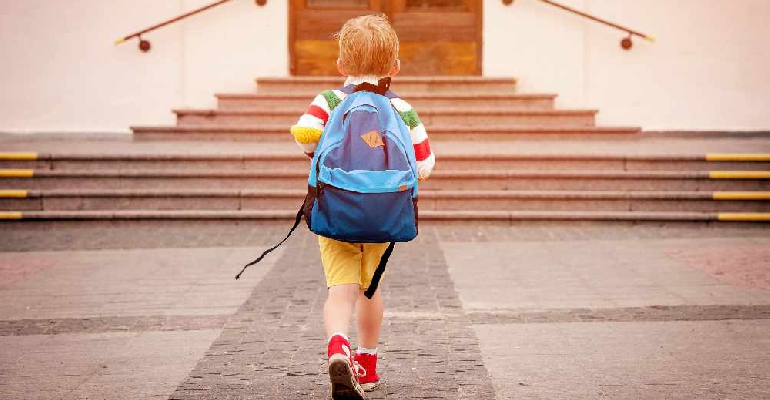
Navigating the emotions of starting primary and secondary school can be tricky, so an early years educational psychologist has offered some advice and guidance for parents.
Primary school starters
As a new academic year approaches, many children will be getting ready for their first day at primary school and they and their parents may be feeling anxious or worried about this significant moment.
To help parents and carers navigate this momentous occasion, the British Psychological Society (BPS) has provided top tips from its expert members, helping children to feel happy, safe and secure as they start in their new setting.
Dr Abigail Wright, Specialist Senior Early Years Educational Psychologist and member of the BPS’s Division of Educational and Child Psychology, says:
“Starting school can be an emotionally demanding time for both children and parents, as young ones experience separation from their caregivers and branch out into a new world for the first time.
“Separation could feel difficult because being and feeling close is key to a little one’s (and also sometimes an adult’s) feelings of safety and security. Developing familiarity and trust will be key to supporting them to settle.”
Dr Wright has provided some practical tips on how to best manage the transition:
- Communicate with your child in a positive and cheerful way about starting school – “It is so exciting that you’re going to see your friends again”, “I wonder what you will play…” You can use visuals, signs, sounds, touch - to help communicate according to your child's unique preferences.
- Your child might feel many emotions, including sad, angry or scared. Be available for them, don't be too quick to distract them, and at the end, remind them of all the good things about starting school.
- Develop fun and multi-sensory ways to ‘check in’ with how your child is feeling e.g., through song/rhyme, play or art. Photographs or pictures of activities/objects and songs can help to develop children’s awareness and their understanding of new routines.
- Be patient with your child – they may not be able to do things that they were able to do before. Even though they could use the toilet before starting school, they might start having accidents. This is normal.
“Above all, reassure your child," says Dr Wright. “When you have chatted to them, reassure them that you will be there to answer any questions or talk about this again in the future when they want to.”
Secondary school starters
As September dawns, and a new cohort of pupils prepare for life in secondary school, adjusting to the change can prove both exciting and challenging for both children and parents.
While secondary school opens up many new opportunities for children, it also represents a huge time of change for parents and caregivers as well as children.
To help manage this transition, the British Psychological Society (BPS) has provided guidance from its expert members, helping children to cope with, and thrive in, their new school environment.
Dr Sarah Chestnutt, educational psychologist and member of the BPS’s Division of Educational and Child Psychology, said:
“The transition to a new phase of education brings many changes, including new routines and ways of learning, working with more teachers and changes in expectations, and new friendships. This can be an exciting, but also a daunting, time for children."
“Despite the challenges, many children flourish in their new environment, and parents and carers can play an important role in preparing their child for their new school."
Dr Chestnutt has given some tips for parents and caregivers to help this process:
- If your child’s new school has provided information as part of their transition, find time to talk through this with them more than once to help familiarise them with the new environment.
- Alternatively, looking through the school website, or watching videos which the school have created, can be helpful.
- Make a practice journey from home to school to help your child become used to the route they will take (whether this is with you, independently, or with friends). You could use this opportunity to remind them of how they can keep safe, and what they might do if they need help.
- Plan what your new routine will look like once your child starts school. If your child likes to see a routine visually, work together to create a visual timetable of the morning before school and returning from school in the afternoon. This will help them understand what will be happening and make things feel more predictable for them.
- Allow your child time to talk about what they are looking forward to about starting the new school, such as opportunities to study different subjects, meeting new friends and developing existing friendships. Give them space to share any worries they might have with you, talking through together ways of managing their concerns. It’s usually best to do this during the day rather than right before bedtime.
- Feeling worried or apprehensive about your child starting secondary school is very normal for parents and carers too. It’s important to support your own wellbeing and use strategies to help reduce your anxiety. For example, why not make a list of what you need to do before term starts, and break tasks into smaller chunks to help them feel more manageable? Take time for yourself by doing something you enjoy, like having a bath, reading a book or going for a short walk.

 Five Memorable Oasis Performances To Get Us In The Mood
Five Memorable Oasis Performances To Get Us In The Mood
 Five Amazing Places To Visit In September
Five Amazing Places To Visit In September
 Five Incredible Waterfalls You Need to Visit
Five Incredible Waterfalls You Need to Visit
 Five Amazing Barbecue Dishes to Try from Around the World
Five Amazing Barbecue Dishes to Try from Around the World
 Five Strangest Theme Park Rides Around the World
Five Strangest Theme Park Rides Around the World